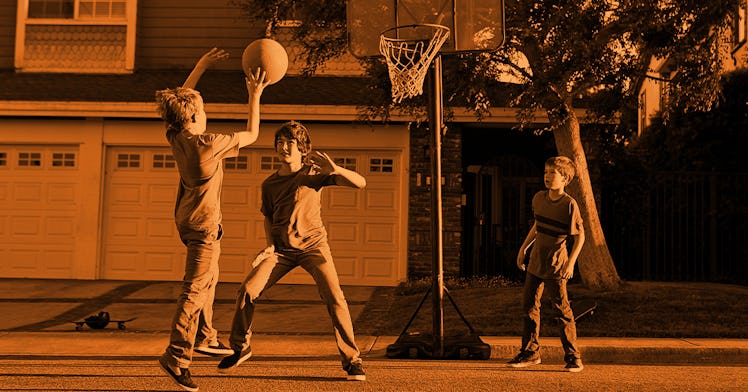How to Make Neighborhood Friends and Socialize Kids
Kids get huge benefits from having amigos nearby, but sometimes parents need to sacrifice for it.

I was settled in an Adirondack chair on my front lawn. The late summer afternoon was crisp and breezy in the suburbs of Cleveland. My two boys were running in circles making revving-crashing-whooshing noises as they are want to do. Suddenly two more children, a boy and a girl, appeared in my driveway. They were neighborhood kids, older than my children, but not by much. The boy was from across the street and girl from two houses down. I’d never spent much time with either kid, but my first-grader rides the bus with both in the morning and he seemed cool with their presence.
“We came over to see if you wanted to play,” the boy said. And, just like that, my two were folded into a quartet and the four slipped into a rollicking game of chase.
READ MORE: The Fatherly Guide to Socializing Kids
I never wanted to live in Ohio. I was content with the urban weirdness of Portland, Oregon when my first boy arrived. I didn’t plan to give in to my wife’s pleas to move back to her Rockwellian home. But I also wanted my kids to have a happy childhood and I came to understand that living in a community built for me wasn’t best for them. I concluded that they (one was still hypothetical, but still) needed space to run around and kids to run around with. We moved.
My supposition, it turns out, was true. Just as children benefit from relationships with extended family like cousins, they also benefit from having neighborhood friends close at hand according to Dr. Mayra Mendez, program coordinator for intellectual and developmental disabilities and mental health services at Providence Saint John’s Child and Family Development Center.
“In a world where there are more hours of structured and programmed activities than there are unstructured creative experiences,” Mendez explains. “Having friends to play with that live nearby within the neighborhood allows for spontaneity to engage in relationships.”
I totally get this. Between homework, school activities and the nightly schedule, my boys have little time to really lean into social play. That evening their friends first came over, there was a window of opportunity. That window would have been shut had we been anywhere else. But my neighborhood is lousy with kids. The chances for random acts of play are high. Windows are open. They don’t all have pies on the sills, but it feels like that. It feels like there’s a protected space for families and for play. Mendez confirms that such a feeling is meaningful and important.
“Having friendships within proximity provides children with opportunities to socialize more frequently, explore and play freely and creatively, engage in conversation and share in community consciousness,” she says.
But Mendez also notes that there’s a lot to be learned in the conversation and engagement. My boys picking characters to adopt with their older friends allows them to learn negotiation. When someone falls and the game comes to a screeching halt, they need to empathy to get it back on track. One would think that this could happen anywhere, like at school or in random encounters at the park, but school can be too structured and codified, and chance playground encounters can be intimidating if a child isn’t outgoing. Neighborhood friends offer something special.
“It is particularly beneficial for children to have easy access to playing with other children in a carefree and open environment,” Mendez says. “Friendships in general, help children build positive self-esteem and learn social competence and play is the means by which relationships with friends are actualized.”
Granted, my neighborhood is set up for this kind of actualization. There are no fences here specifically to allow children to roam. It’s relatively dense with quiet roads that allow children to get around. The home prices are reasonable and the school district is highly rated, making it ideal for middle-class families with children. It’s Pleasantville in a non-pejorative sense. It is also not the norm. That creates a barrier for parents who might live in urban areas because the onus is really on them to be neighborhood matchmakers for kid friendships.
“The parent themselves need to feel safe,” Mendez says. “One of the ways to promote friendships in the neighborhood community is for parents to be seen in the community; for them to walk in the community and take their kids out into the community and play.”
If there is a yard available Mendez suggests playing in it. If not, parents can reach out to neighbors with children, get to know them, and invite their families over. But she also points out that some neighborhoods have mechanisms built into the calendar, like block parties, street fairs and festivals that might make this easier. Saying hello can still be tough, but it makes a difference.
Which is all to say that my kids are lucky in a lot of ways. They are also unlucky in one specific way: My suburban neighborhood is homogenous and white. So while my kids have good neighborhood friends, none of those friends are kids of color. My kids are missing out on some cultural understanding they might get elsewhere.
“There are differences,” Mendez notes. “Look at the enrichment you get from knowing that a neighbor lives differently or has a different tradition. Not only does that build respect, it builds knowledge. It’s a very good thing for parents to promote.”
Do I miss Portland and the diversity of a city? I do. But I also love my community and, more importantly, so do my kids. They don’t know how lucky they are and, for now, they don’t need to.
This article was originally published on